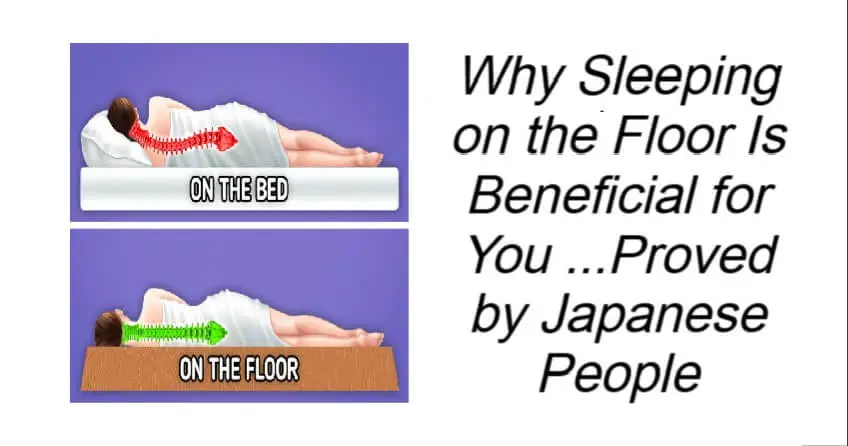Why Sleeping on the Floor Is Beneficial for You …Proved by Japanese People
A centuries-old practice with modern health benefits
Japan is known for its minimalist lifestyle, cultural traditions, and remarkably long life expectancy. One practice that continues to capture global attention is sleeping on the floor — not out of necessity, but as a deliberate choice. While Western cultures have long favored plush mattresses and elevated beds, the Japanese tradition of floor-sleeping offers more than just space-saving convenience. It may actually come with a range of health and wellness benefits.
Let’s explore why this ancient habit has stood the test of time—and whether it might be right for you.
Benefits of Sleeping on the Floor
1. Saves You Money
Let’s start with practicality.
The average mattress costs around $1,000, not including the cost of a frame or foundation. If you make the wrong purchase, returns and replacements can be time-consuming and expensive. Floor-sleeping removes the need for both a mattress and bed frame, offering a minimalist, budget-friendly alternative.
2. Improves Blood Circulation
Sleeping on a flat, firm surface helps distribute body weight evenly, which can reduce pressure on specific areas and enhance blood flow.
By avoiding compressed sleeping positions—like curling on your side—you reduce your risk of numbness, tingling, and even circulation-related issues like varicose veins.
3. Supports Spinal Alignment & Eases Back Pain
Over time, soft mattresses tend to sag, leading to spinal misalignment and chronic discomfort.
Medical professionals often recommend placing plywood under a sagging mattress to regain firmness.
Sleeping on the floor naturally encourages proper posture during rest, which may reduce or prevent lower back pain and improve long-term spinal health.
4. Improves Posture
When your spine is supported during sleep, your daytime posture improves as well.
A pain-free back reduces the urge to slouch, making floor-sleeping a gentle way to retrain your body into standing and sitting straighter.
5. Makes It Easier to Wake Up on Time
Sleeping on a cozy, overly soft bed can make it all too tempting to hit snooze again and again.
Floor-sleeping offers just enough comfort without encouraging oversleeping, helping you wake up more refreshed and on schedule.
Downsides to Consider
While there are real perks, floor-sleeping isn’t ideal for everyone. Let’s look at the potential disadvantages:
– Allergies
Sleeping on the floor increases exposure to dust, pet hair, skin cells, and allergens that settle lower in the room. If you’re sensitive, this could trigger respiratory issues or worsen allergy symptoms.
– Mold & Mildew Risk
Without airflow beneath your mattress or bedding, heat and moisture can get trapped, increasing the likelihood of mold or mildew. This can be especially problematic in humid climates or with foam mattresses placed directly on the floor.
– Reduced Comfort for Some
While a firm surface may relieve back pain for some, others may experience discomfort at pressure points, especially in the hips, shoulders, or lower back. Older individuals or those with lean body types may find it harder to adjust.
– Pest Exposure
Being closer to the ground can expose you to insects and pests like ants, bed bugs, or even cockroaches. Combat this risk by keeping the floor clean, elevating your bedding during the day, and using a quality mattress protector.
Who Should Avoid Sleeping on the Floor?
Sleeping on the floor isn’t for everyone. Here’s who may want to skip it:
- People with bone disorders (e.g., osteoporosis): Hard surfaces may worsen joint discomfort.
- Older adults: Getting up and down from the floor can be physically challenging and increase fall risk.
- People sensitive to cold: Floors stay cooler than elevated beds, which can make for an uncomfortable night in colder months or climates.
Bonus Tip: Try Sleeping Without a Blanket
It might sound strange, but skipping a blanket can promote faster sleep onset and better temperature regulation, especially in warm environments. However, this isn’t for everyone—if comfort and warmth matter most to your rest, stick with what works for your body.
Final Thoughts
The Japanese tradition of sleeping on the floor isn’t just cultural—it’s deeply connected to wellness, simplicity, and functionality. While it may not suit everyone, the potential benefits are worth considering, especially if you’re seeking better posture, improved sleep quality, or a minimalist lifestyle.
Before making the switch, try it out gradually and listen to your body. A thin futon, yoga mat, or tatami mat can offer a good starting point without the shock of going straight to the hardwood.
Your sleep space should support your health—not just your habits.
You’ve just read, Why Sleeping on the Floor Is Beneficial for You. Why not read Manager Had To Hire A New Employee.

